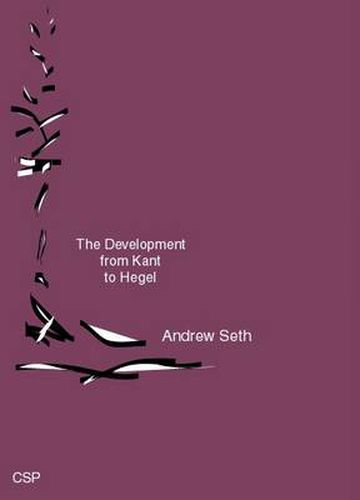Readings Newsletter
Become a Readings Member to make your shopping experience even easier.
Sign in or sign up for free!
You’re not far away from qualifying for FREE standard shipping within Australia
You’ve qualified for FREE standard shipping within Australia
The cart is loading…






This important contribution to the study of German philosophy in the English speaking world. The first of two parts, the main core of Seth’s analyses of the works of Kant, Fichte, Schelling, and Hegel, was written in the summer of 1880 while the author was a Hibbert Travelling Scholar. The second part, a philosophy of religion, as this is derived from the conclusions of the first part, was written at the request of the Trustees. As the author declares in his preface to the 1882 edition, he restricts his attention to the fundamental metaphysical position occupied by the four thinkers. Fichte is given especially careful consideration, and a number of works by each of the philosophers that, at the time of writing, had been neglected, have been thoroughly scrutinised. It can quite fairly be said that Andrew Seth’s work played an important role in the formation of British idealism and its focus on German idealists such as the one’s under consideration here. But this role aside, the work is a brilliant analysis of German thought that will appeal even to the readers of today.
$9.00 standard shipping within Australia
FREE standard shipping within Australia for orders over $100.00
Express & International shipping calculated at checkout
This important contribution to the study of German philosophy in the English speaking world. The first of two parts, the main core of Seth’s analyses of the works of Kant, Fichte, Schelling, and Hegel, was written in the summer of 1880 while the author was a Hibbert Travelling Scholar. The second part, a philosophy of religion, as this is derived from the conclusions of the first part, was written at the request of the Trustees. As the author declares in his preface to the 1882 edition, he restricts his attention to the fundamental metaphysical position occupied by the four thinkers. Fichte is given especially careful consideration, and a number of works by each of the philosophers that, at the time of writing, had been neglected, have been thoroughly scrutinised. It can quite fairly be said that Andrew Seth’s work played an important role in the formation of British idealism and its focus on German idealists such as the one’s under consideration here. But this role aside, the work is a brilliant analysis of German thought that will appeal even to the readers of today.